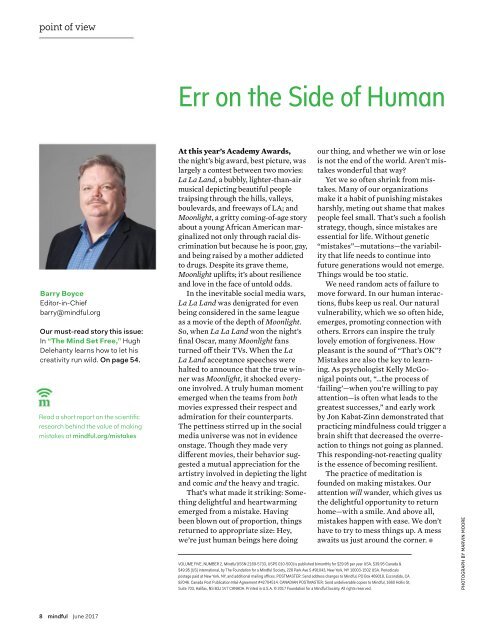Mindful June 2017
Create successful ePaper yourself
Turn your PDF publications into a flip-book with our unique Google optimized e-Paper software.
point of view<br />
Err on the Side of Human<br />
Barry Boyce<br />
Editor-in-Chief<br />
barry@mindful.org<br />
Our must-read story this issue:<br />
In “The Mind Set Free,” Hugh<br />
Delehanty learns how to let his<br />
creativity run wild. On page 54.<br />
Read a short report on the scientific<br />
research behind the value of making<br />
mistakes at mindful.org/mistakes<br />
At this year’s Academy Awards,<br />
the night’s big award, best picture, was<br />
largely a contest between two movies:<br />
La La Land, a bubbly, lighter-than-air<br />
musical depicting beautiful people<br />
traipsing through the hills, valleys,<br />
boulevards, and freeways of LA; and<br />
Moonlight, a gritty coming-of-age story<br />
about a young African American marginalized<br />
not only through racial discrimination<br />
but because he is poor, gay,<br />
and being raised by a mother addicted<br />
to drugs. Despite its grave theme,<br />
Moonlight uplifts; it’s about resilience<br />
and love in the face of untold odds.<br />
In the inevitable social media wars,<br />
La La Land was denigrated for even<br />
being considered in the same league<br />
as a movie of the depth of Moonlight.<br />
So, when La La Land won the night’s<br />
final Oscar, many Moonlight fans<br />
turned off their TVs. When the La<br />
La Land acceptance speeches were<br />
halted to announce that the true winner<br />
was Moonlight, it shocked everyone<br />
involved. A truly human moment<br />
emerged when the teams from both<br />
movies expressed their respect and<br />
admiration for their counterparts.<br />
The pettiness stirred up in the social<br />
media universe was not in evidence<br />
onstage. Though they made very<br />
different movies, their behavior suggested<br />
a mutual appreciation for the<br />
artistry involved in depicting the light<br />
and comic and the heavy and tragic.<br />
That’s what made it striking: Something<br />
delightful and heartwarming<br />
emerged from a mistake. Having<br />
been blown out of proportion, things<br />
returned to appropriate size: Hey,<br />
we’re just human beings here doing<br />
our thing, and whether we win or lose<br />
is not the end of the world. Aren’t mistakes<br />
wonderful that way?<br />
Yet we so often shrink from mistakes.<br />
Many of our organizations<br />
make it a habit of punishing mistakes<br />
harshly, meting out shame that makes<br />
people feel small. That’s such a foolish<br />
strategy, though, since mistakes are<br />
essential for life. Without genetic<br />
“mistakes”—mutations—the variability<br />
that life needs to continue into<br />
future generations would not emerge.<br />
Things would be too static.<br />
We need random acts of failure to<br />
move forward. In our human interactions,<br />
flubs keep us real. Our natural<br />
vulnerability, which we so often hide,<br />
emerges, promoting connection with<br />
others. Errors can inspire the truly<br />
lovely emotion of forgiveness. How<br />
pleasant is the sound of “That’s OK”?<br />
Mistakes are also the key to learning.<br />
As psychologist Kelly McGonigal<br />
points out, “…the process of<br />
‘failing’—when you’re willing to pay<br />
attention—is often what leads to the<br />
greatest successes,” and early work<br />
by Jon Kabat-Zinn demonstrated that<br />
practicing mindfulness could trigger a<br />
brain shift that decreased the overreaction<br />
to things not going as planned.<br />
This responding-not-reacting quality<br />
is the essence of becoming resilient.<br />
The practice of meditation is<br />
founded on making mistakes. Our<br />
attention will wander, which gives us<br />
the delightful opportunity to return<br />
home—with a smile. And above all,<br />
mistakes happen with ease. We don’t<br />
have to try to mess things up. A mess<br />
awaits us just around the corner. ●<br />
VOLUME FIVE, NUMBER 2, <strong>Mindful</strong> (ISSN 2169-5733, USPS 010-500) is published bimonthly for $29.95 per year USA, $39.95 Canada &<br />
$49.95 (US) international, by The Foundation for a <strong>Mindful</strong> Society, 228 Park Ave S #91043, New York, NY 10003-1502 USA. Periodicals<br />
postage paid at New York, NY, and additional mailing offices. POSTMASTER: Send address changes to <strong>Mindful</strong>, PO Box 469018, Escondido, CA<br />
92046. Canada Post Publication Mail Agreement #42704514. CANADIAN POSTMASTER: Send undeliverable copies to <strong>Mindful</strong>, 1660 Hollis St,<br />
Suite 703, Halifax, NS B3J 1V7 CANADA. Printed in U.S.A. © <strong>2017</strong> Foundation for a <strong>Mindful</strong> Society. All rights reserved.<br />
PHOTOGRAPH BY MARVIN MOORE<br />
8 mindful <strong>June</strong> <strong>2017</strong>


